|
Better Learn Chinese.
China Can Now Make or Break US Economy!
Look at the Tiger Index of 35 Chinese stocks and closed end funds. The US and
Chinese markets and fortunes seem to be
running on parallel tracks.

Chinese Stocks Are
Predicted Well by Tiger's Peerless Buy and Sell Signals.
We now offer daily data
on these stocks, too. And Tiger lets you build your own
index of any
group of stocks you like.
---------------------------------------------------------------------------------------------------------------------------
China is on The Move!
1,500,000,000
- The estimated current population of China.
China's sustained
economic growth has been amazing. Its gross domestic product (GDP) rose, on average,
more than 8 percent annually since 1978.
China has become a major player in the global economy. All the
talk about inefficient bureaucracies and
corruption pale when considering this growth. Pollution and rural
poverty remain unsolved problems.
China's economic output in 2006 was $2.68 TRILLION, the third largest
in the world. 70% of China's GDP is
in the private sector. The smaller public sector is dominated by about
200 large state enterprises concentrated mostly in utilities, heavy
industries, and energy
resources.

Since 1978 the People's Republic of China (PRC) government has
been reforming its economy from a
Soviet-style centrally
planned economy to a more market-oriented economy while remaining within the
political framework provided by the Communist Party of China. This system has been called
"Socialism
with Chinese characteristics" and
is one type of mixed
economy. These reforms started since 1978 has
helped lift millions of people out of
poverty, bringing the poverty rate down from 53% of population in
1981 to 8% by 2001 (See: http://en.wikipedia.org/wiki/Economy_of_the_People's_Republic_of_China
)
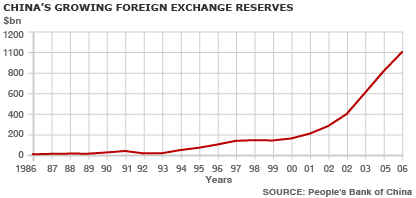
( Source: http://news.bbc.co.uk/1/hi/business/6106280.stm
)
Example,
when you go to Home Depot, look around. See where things are made.
Made in China exceeds made in US 3:1, at least. Try Walmart's, too.
----------------------------------------------------------------------------------------------------------------------------
How Much of A Threat Is China?
In many ways, we in the US are fortunate that it is China that has become so powerful.
Except for
Tibet, China does not have a history of
imperialism or attacking its neighbors since the militaristic Manchu or
Qing Dynasty of
the 17th century. Its rulers then were not ethnically Han Chinese but Manchu.
(See http://en.wikipedia.org/wiki/Chinese_imperialism
)
 Flag - 1890-1912. Flag - 1890-1912.  Chinese Flag Now.
Chinese Flag Now.
China is ruled by an aging Communist (mostly in name) oligarchy, who are more interested
in economic
development than ideological crusades. They are
often ruthless with internal opponents, but they also practical
and patient, believing history is on their
side. Those in the West who paint China as an inevitable opponent in
the competition for secure natural resources,
most notably oil, tell us that China is just biding its time before
it can use manipulation of its currency to
create financial panic and havoc in the United States.
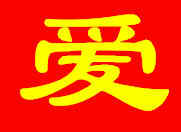 Love
Love  Peace Peace
(Better learn Chinese - http://www.chinapage.com/learnchinese.html
)
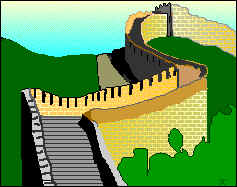 |
The Great Wall of China was built over 2,000 years ago, by Qin Shi
Huangdi,
the first emperor of China during the Qin (Ch'in) Dynasty (221 B.C - 206 B.C.).
After subjugating and uniting China from seven Warring States, the emperor
connected and extended four old fortification walls along the north of China that
originated about 700 B.C. (over 2500 years ago). Armies were stationed along
the wall as a first line of defense against the invading nomadic Hsiung Nu tribes
north of China (the Huns).
Signal fires from the Wall provided early warning of an
attack....During the Ming Dynasty (1368-1644), the Great Wall was enlarged to 6,400
kilometers (4,000 miles) and renovated over a 200 year period, with watch-towers
and cannons added. |
|
A Dollar Free-Fall Is Surely Coming
>>>> Clinton's last budget had a
$250 billion dollar surplus.
>>>> China's trade surplus
jumped almost 60 percent in July, widening to $23.1 billion
from $14.6 billion a year earlier.
>>>> China has 70% of its trillion dollar
foreign exchange reserves in low yielding US
fixed income securities, whose value has steadily declined as the dollar buys less and
less.
>>>> The cost of Bush's war on Iraq will
surely be far more than a trillion dollars when
all the bills come in.
>>>> The US federal government now
owes $2.2 trillion to foreigners and foreign nations.
US Pressures on China
China, unlike Europe and the rest of the Western world, has refused to let the dollar fall
freely against its
currency. Instead, the Chinese leaders have decided
to keep the yuan’s value pegged closely to the dollar,
allowing it to rise by only 9 percent over the past
two years. Many US Congressmen say that American
businesses would be more competitive globally if the
dollar’s international value depreciated. The US Treasury
claims the yaun is 40% under-value and that the
Chinese leadership must soon lift it vis-a-vis the dollar.
True,
a cheaper dollar would make American exports relatively less expensive. America
should
be able to sell more goods to its trade partners, and
the trade deficit should diminish. This view does not
seem to understand how much of the industrial base of the
US has already been lost overseas. It would
surely take 15 years to rebuild an industrial base here, if
there was the political will, which there is not
presently. The Bush Administration is too busy
wasting money a world away. A much reduced dollar
that would mean dramatically higher prices in the US.
It would mean the US would have to borrow at much
higher interest rates and send that much more American
wealth to foreigners. President Franklin Roosevelt
once stated that America did not need to worry about debt because
it was owed to Americans. Those days
are now a distant memory.
As America becomes more
and more projectionist vis-a-vis China, it may soon unleash a global backlash.
No longer the dominant creditor nation, it is now the
world's largest debtor nation. The US federal
government owes $2.2 trillion to foreigners and
foreign nations.
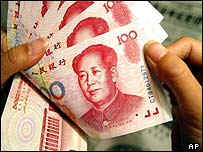
What if China Dumped Its US Treasury Notes and Bonds?
What if It imply Stopped Buying Them?
"In a Wednesday opinion piece in the state-run China Daily, a Chinese government researcher made
what sounded like a warning to U.S. policymakers not to get
too tough in insisting the yuan should appreciate.
The researcher, He Fan, noted that China
has accumulated "a large sum of U.S. dollars" and that its holdings
contribute "a great deal to maintaining the position
of the U.S. dollar as an international currency." If the yuan's
exchange-rate against the dollar does not remain stable, he
said, China could be forced to take strong action.
China has $1.33 trillion in foreign-exchange reserves, with
$407 billion in U.S. Treasuries, the second-largest
holder after Japan.
A substantial sell-off of the reserves could spark a recession in the U.S. economy, which
is
already experiencing a housing slump, financial analysts
said.... He's statements were an apparent response
to the Senate Finance Committee, which last month approved legislation aimed at
pressing for faster
appreciation of the yuan." (Source: August 9th - Washington Post Krissah Williams )
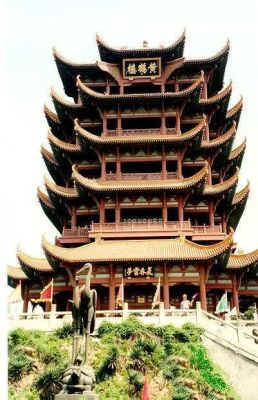

But China Is Hooked on American Exports, too.
China
would hurt itself if it dumped its US securities. After Japan, China is America's biggest
lenders.
Dumping US securities would cause a panic in a key asset it owns.
And if it stopped lending money to the
US, it would devastate its own growing economy. Their
economy is heavily dependent on US exports.
81% of the Chinese Gross National Product goes into foreign
trade.

The Mere Threat of Dumping May Cause The Dollar To Fall
Sharply
Fear,
itself, drops the dollar. The mere fear that any country, and it might be China,
Japan, Korea
or an OPEC country would no longer take any more dollars or US debt may
cause other foreign holders
to get out of dollars.or sell US Treasury securities and US stocks.
Consequences of A Refusal To Accept Dollars Will Be Very
Inflationary
The US Treasury would then
have to print a lot more money or raise interest rates to attract
foreigners into financing the ever-growing, on-going debt.
Prices for US consumers will rise dramatically.
Since the US has lost so much of its industrial base to
China and elsewhere, stores in the US will still
have to stock their shelves with things made overseas, but
which now cost a lot more. With less
buying power and less money to invest, the US stock market
will surely decline. That would almost
certainly bring a global recession/depression, economic
nationalism, tariffs, quotas and, probably, war,
in all its futility. When the US was forced to go off
the last vestiges of the Gold Standard in the early 1970s,
to help pay for the US war in Viet Nam, it led to
violent ups and downs of the stock market until 1982.
A Dollar Collapse Could Bring Hyper-Inflation to the US.
Here inflation
becomes "A vicious circle is created in which more and
more inflation is created with each
iteration of the cycle. Although there is a great deal of debate
about the root causes of hyperinflation, it becomes
visible when there is an unchecked increase in the money supply or
drastic debasement of coinage, and is often
associated with wars (or their aftermath), economic
depressions, and political or social upheavals. This has most
often occurred because of excessive money printing. It
effectively wipes out the purchasing power of private and
public savings, distorts the economy in favor of extreme
consumption and hoarding of real assets, causes the
monetary base whether specie or hard currency to
flee the country, and makes the afflicted area anathema to
investment. The aftermath of hyperinflation is equally
complex. As hyperinflation has always been a traumatic
experience for the area which suffers it, the next policy regime
almost always enacts policies to prevent its recurrence.
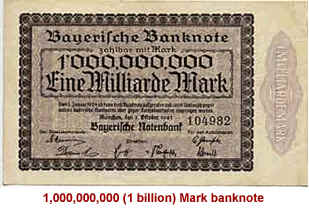
The 1920s German inflation
Before
World War I Germany was a prosperous country, with a gold-backed currency, expanding
industry,
and world leadership in optics, chemicals, and machinery. The German
Mark, the British shilling, the French franc,
and the Italian lira all had about equal value, and all were exchanged
four or five to the dollar. That was in 1914. In
1923, at the most fevered moment of the German hyperinflation, the
exchange rate between the dollar and the Mark
was one trillion Marks to one dollar, and a wheelbarrow full of money
would not even buy a newspaper.
(Source: http://www.pbs.org/wgbh/commandingheights/shared/minitext/ess_germanhyperinflation.html
)
Germany abandoned the
gold backing of its currency in 1914. The war was expected to be short, so it was
financed by government borrowing, not by savings and taxation. In
Germany prices doubled between 1914 and
1919. Bourgeois habits were very strong. Ordinary citizens worked
at their jobs, sent their children to school
and worried about their grades, maneuvered for promotions and
rejoiced when they got them, and generally expected
things to get better. But the prices that had doubled from 1914
to 1919 doubled again during just five months in
1922. Milk went from 7 Marks per liter to 16; beer from 5.6 to 18.
There were complaints about the high cost of
living. Professors and civil servants complained of getting
squeezed. Factory workers pressed for wage increases.
An underground economy developed, aided by a desire to beat the
tax collector.
On June 24, 1922,
right-wing fanatics assassinated Walter Rathenau, the moderate, able foreign minister.
Rathenau was a charismatic figure, and the idea that a popular,
wealthy, and glamorous government minister could be
shot in a law-abiding society shattered the faith of the Germans,
who wanted to believe that things were going to be all
right. Rathenau's state funeral was a national trauma. The
nervous citizens of the Ruhr were already getting their money
out of the currency and into real goods -- diamonds, works of art, safe
real estate. Now ordinary Germans began
to get out of Marks and into real goods.
It is sometimes
argued that Germany had to inflate its currency to pay the war reparations required under
the Treaty of Versailles, but this is only part of the story.
Reparations accounted for about one third of the
German deficit from 1920 to 1923. Nonetheless, the government
found reparations a convenient scapegoat.
Other scapegoats included Jewish bankers and foreign speculators became
popular political targets. The inflation
reached its peak by November 1923, but ended when a new currency (the Rentenmark)
was introduced.
The government stated this new currency had a fixed value, and this was
accepted. Hyperinflation did not directly
bring about the Nazi takeover of Germany; the inflation ended with the introduction of
the Rentenmark and the
Weimar Republic continued for a decade afterward. The inflation did,
however, raise doubts about the
competence of liberal institutions, especially amongst a middle class, many of
whom lost their all their savings.
Nothing makes me think America would be not be a ripe ground for
fascism if this happened.
(See http://en.wikipedia.org/wiki/Hyperinflation#Root_causes_of_hyperinflation
)
Additional Sources:
http://www.oftwominds.com/blogjuly06/hot-airdragon.html
http://www.financialsense.com/fsu/editorials/dorsch/2006/1129.html
)
http://johnibii.wordpress.com/2007/07/25/to-the-us-treasury-secretary-china-is-your-worst-nightmare-sir/
|




 Flag - 1890-1912.
Flag - 1890-1912.  Chinese Flag Now.
Chinese Flag Now. Love
Love  Peace
Peace




